You may also like:
The 2024 BMW i7 is BMW’s flagship full-size electric luxury sedan that redefines electrified sophistication with three distinct trim levels—eDrive50, xDrive60, and M70—priced from $106,695 to $169,495. With EPA-estimated range spanning 291 to 321 miles depending on configuration, the i7 competes directly with the Mercedes-Benz EQS and Tesla Model S while offering industry-leading rear-seat entertainment through its optional 31-inch theater screen[1]. For 2024, BMW introduced the rear-wheel-drive eDrive50 entry model and the high-performance M70 variant, expanding choices for luxury EV buyers seeking electric opulence without compromise[2].
According to Autvex automotive experts, the 2024 i7 delivers exceptional comfort, pampering ride quality thanks to adaptive air suspension, and effortless acceleration despite weighing over 6,000 pounds. The vehicle targets executive buyers transitioning from traditional 7 Series sedans, tech enthusiasts wanting cutting-edge automotive innovation, and chauffeur-driven professionals who prioritize rear-seat entertainment and limousine-like spaciousness over maximum driving range[3].
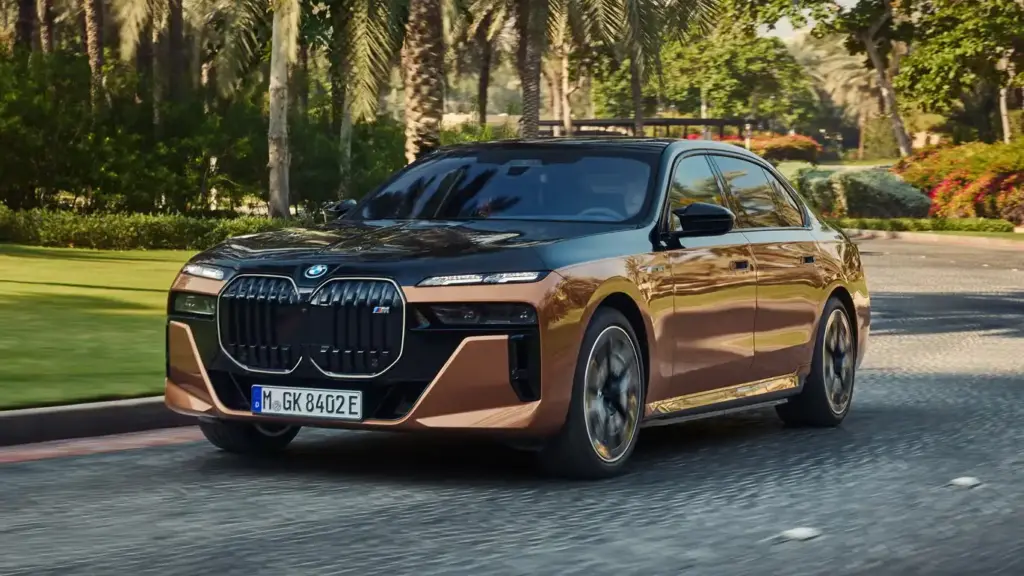
Overview: what makes the 2024 BMW i7 special
The 2024 BMW i7 represents BMW’s most ambitious electrification effort, combining traditional luxury sedan craftsmanship with cutting-edge electric powertrain technology. The expanded lineup provides options ranging from efficiency-focused to performance-oriented configurations.
Quick snapshot of the i7 electric flagship
| Specification | eDrive50 | xDrive60 | M70 xDrive |
|---|---|---|---|
| Starting MSRP | $106,695 | $125,195 | $169,495 |
| Horsepower | 449 hp | 536 hp | 650 hp |
| Torque | 549 lb-ft | 549 lb-ft | 811 lb-ft (boost) |
| Drivetrain | RWD | AWD | AWD |
| EPA Range | 321 miles | 318 miles | 291-295 miles |
| 0-60 mph | 5.3 seconds | 4.1 seconds | 3.3 seconds |
| Top Speed | 127 mph | 150 mph | 155 mph |
The i7 occupies the ultra-luxury electric sedan segment alongside the Mercedes-Benz EQS (starting at $104,400) and significantly above the Tesla Model S ($74,990-$89,990)[1]. While competitors like the Lucid Air offer longer range (up to 516 miles), the i7 distinguishes itself through traditional luxury materials, superior rear-seat entertainment, and BMW’s established dealer network. Understanding how long it takes to buy a car helps set realistic expectations for the purchasing process.
Key improvements for 2024 model year
BMW expanded the i7 lineup significantly for 2024 with meaningful additions:
- New eDrive50 rear-wheel-drive trim providing entry-level pricing at $106,695
- High-performance M70 all-wheel-drive variant delivering 650 horsepower and supercar acceleration
- Continued xDrive60 all-wheel-drive model bridging efficiency and performance
- Refined BMW Operating System 8.5 with improved response times addressing early owner feedback
- Enhanced Highway Assistant allowing hands-free driving up to 80-85 mph (versus previous 40 mph limit)
These updates position the 2024 i7 competitively against the refreshed Mercedes-Benz EQS while maintaining BMW’s traditional luxury sedan appeal[2].
Target buyer profile
The 2024 BMW i7 appeals to a specific luxury buyer demographic:
- Executive buyers seeking electric luxury without compromising traditional premium appointments
- Tech enthusiasts wanting cutting-edge features including the 31-inch theater screen
- Chauffeur-driven professionals prioritizing rear-seat entertainment and limousine-like comfort
- Former 7 Series owners transitioning to electric powertrains while maintaining brand loyalty
- Luxury buyers valuing ride comfort and prestige over maximum driving range
Autvex analysis indicates i7 buyers typically prioritize rear-seat experience, technology integration, and brand heritage over pure electric efficiency metrics that appeal to Tesla Model S buyers[3].
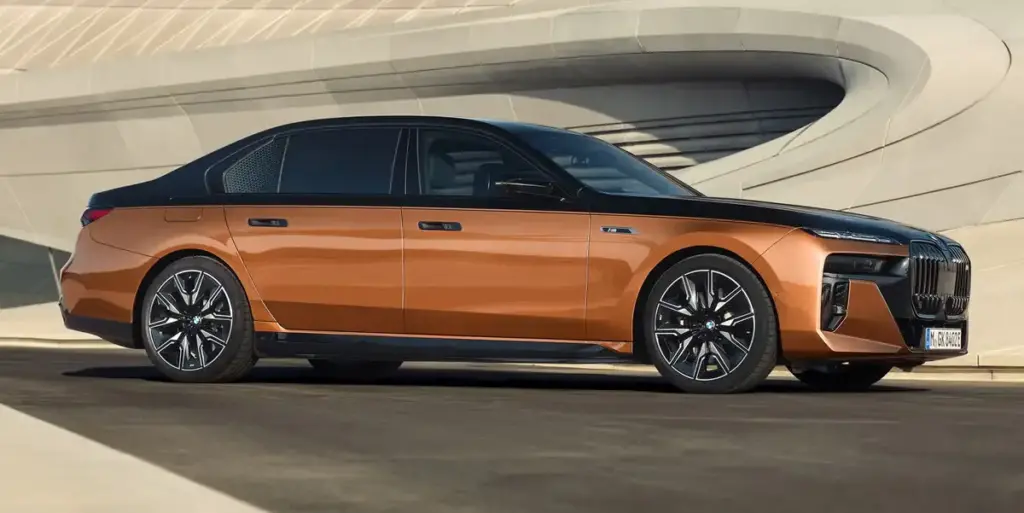
Exterior design and styling
The 2024 BMW i7 showcases bold yet conservative exterior design that honors BMW’s luxury sedan heritage while incorporating modern electric vehicle elements.
Bold design philosophy
BMW designed the i7 with several distinctive exterior characteristics:
- Oversized illuminated kidney grille featuring distinctive LED signature lighting
- Traditional luxury sedan proportions measuring 212.2 inches in overall length
- Sleek roofline balancing elegance with aerodynamic efficiency
- Conservative styling approach versus Mercedes EQS’s more futuristic cab-forward design
- Available two-tone paint options creating upscale visual appeal for executive buyers
The design prioritizes presence and elegance over pure aerodynamic efficiency, appealing to traditional luxury sedan buyers who find the Mercedes EQS styling too unconventional[1].
Distinctive lighting and exterior elements
Premium lighting technology defines the i7’s exterior character:
- Crystal-style LED headlights with adaptive technology adjusting beam patterns automatically
- Animated welcome and goodbye sequences creating theatrical arrival experiences
- Full LED taillights with three-dimensional depth and BMW signature
- Flush door handles presenting automatically when approaching with key fob
- M70-specific elements: gloss-black trim, illuminated grille, 21-inch M light-alloy wheels
The lighting systems contribute to both safety and aesthetic distinction, with the illuminated kidney grille visible from significant distances[2].
Wheel options and exterior packages
Each trim level receives distinct wheel configurations:
- eDrive50: 19-inch wheels optimizing range efficiency (321 miles EPA)
- xDrive60: 20-inch wheels balancing aesthetics and performance (318 miles EPA)
- M70: 21-inch M light-alloy performance wheels (291-295 miles EPA)
Wheel size selection directly impacts EPA range estimates, with larger wheels creating more aerodynamic drag and rotational mass. Buyers prioritizing maximum range should select the eDrive50 with 19-inch wheels[3].
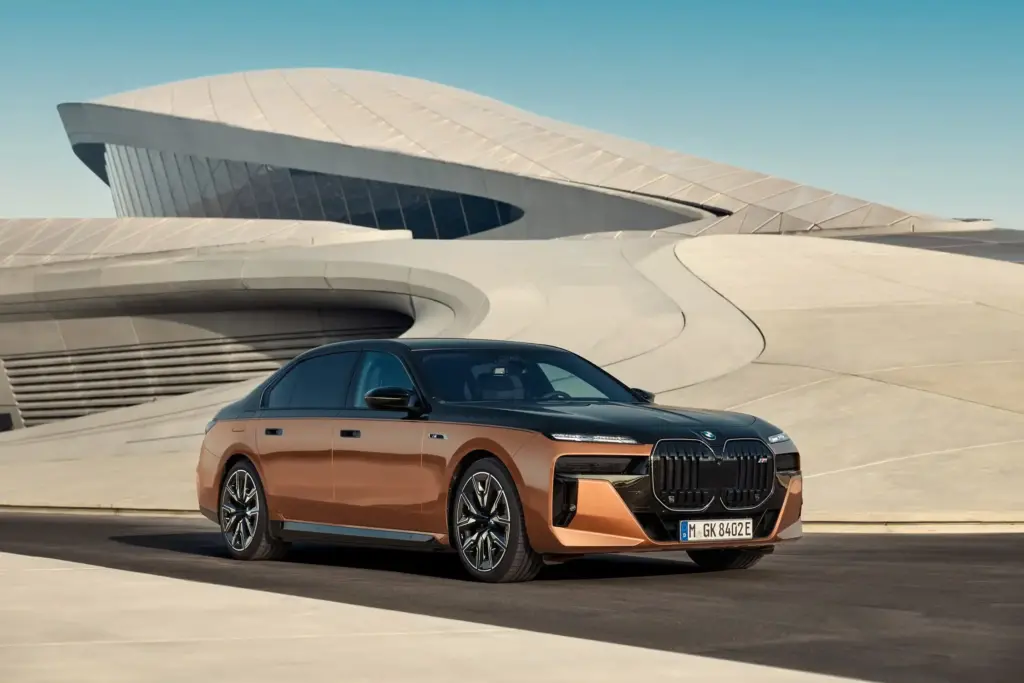
2024 BMW i7 trim levels breakdown
BMW offers three distinct i7 configurations for 2024, each targeting different buyer priorities from efficiency to performance.
eDrive50: entry-level luxury
The new-for-2024 eDrive50 provides accessible entry to i7 ownership:
Key specifications:
- Single rear-mounted electric motor producing 449 horsepower, 549 lb-ft torque
- Rear-wheel drive configuration maximizing efficiency
- Up to 321 miles EPA-estimated range (best in i7 lineup)
- Starting MSRP of $106,695 including $995 destination
- 0-60 mph acceleration in 5.3 seconds, top speed 127 mph
Standard equipment includes:
- 19-inch aerodynamic wheels
- Adaptive air suspension with electronic damping
- Heated and ventilated Extended Merino leather seats
- BMW Curved Display (12.3-inch + 14.9-inch screens)
- 18-speaker Bowers & Wilkins surround sound
- Wireless Apple CarPlay and Android Auto
The eDrive50 represents best value for buyers prioritizing range and efficiency over maximum performance or all-weather capability[1]. Those interested in BMW’s compact offerings can explore the 2024 BMW 2-Series for comparison.
xDrive60: balanced all-wheel performance
The xDrive60 bridges efficiency and performance with dual-motor all-wheel drive:
Key specifications:
- Dual motors (255 hp front, 308 hp rear) totaling 536 horsepower, 549 lb-ft torque
- Intelligent xDrive all-wheel drive with variable power distribution
- Up to 318 miles EPA-estimated range
- Starting MSRP of $125,195 including destination
- 0-60 mph acceleration in 4.1 seconds (tested), top speed 150 mph
Additional features:
- 20-inch wheels with all-season performance tires
- Mirror Oak high-gloss wood trim
- Panoramic Sky Lounge LED roof (standard)
- Enhanced all-weather capability through xDrive system
The xDrive60 delivers ideal balance for buyers wanting strong performance without M70’s substantial price premium[2].
M70 xDrive: high-performance flagship
The new-for-2024 M70 delivers supercar-level acceleration in luxury sedan packaging:
Key specifications:
- Performance-tuned dual motors delivering 650 horsepower
- 811 lb-ft torque with M Sport Boost mode activated
- Up to 291-295 miles EPA-estimated range
- Starting MSRP of $169,495 including destination
- 0-60 mph acceleration in 3.3 seconds, top speed 155 mph
M Sport enhancements:
- 21-inch M light-alloy performance wheels
- M Sport brakes with distinctive calipers
- Active roll stabilization reducing body roll
- Performance-tuned adaptive suspension
- Frozen Deep Grey exclusive matte paint option
The M70 appeals to performance enthusiasts wanting electric supercar acceleration wrapped in luxury sedan comfort and practicality[3].
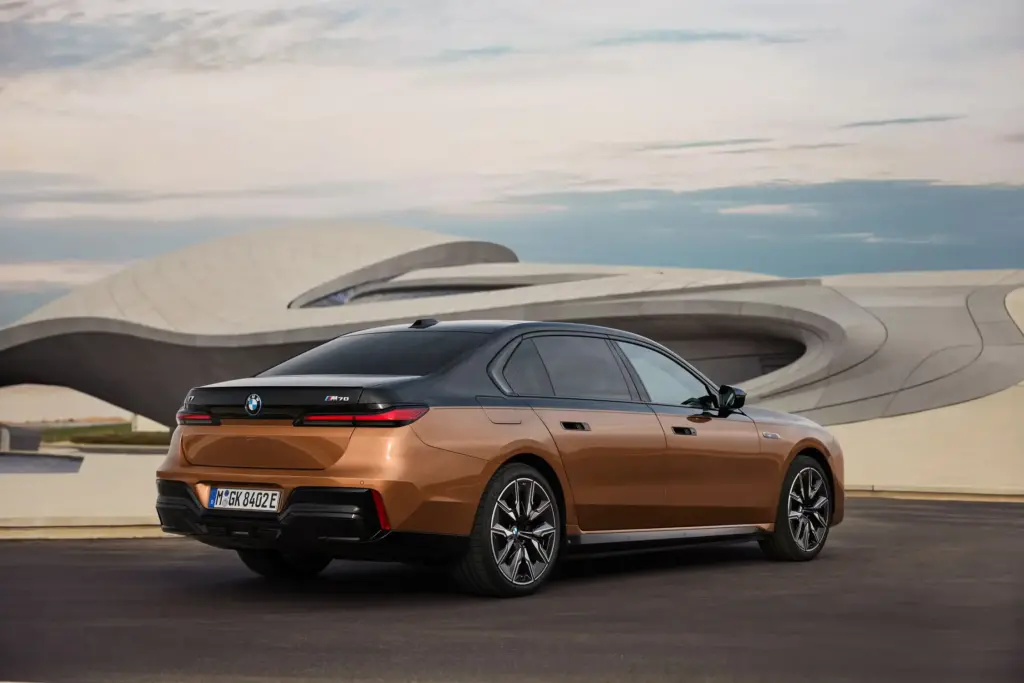
Electric powertrain and performance
The 2024 BMW i7’s electric powertrain delivers impressive performance across all three trim levels while maintaining the smooth, quiet luxury sedan experience BMW customers expect.
Battery technology and specifications
BMW equipped the 2024 i7 with advanced battery technology:
- 101.7 kWh usable capacity lithium-ion battery pack
- Fifth-generation BMW eDrive technology with improved energy density
- Active thermal management system maintaining optimal operating temperatures
- 195 kW DC fast charging capability (10-80% in approximately 35 minutes)
- 11 kW onboard charger for Level 2 home charging (0-100% in 10-11 hours)
- 8-year/100,000-mile battery warranty providing long-term confidence
The battery pack’s floor-mounted position contributes to low center of gravity enhancing handling dynamics despite the i7’s 6,000+ pound curb weight[1].
Motor configuration and power delivery
Each trim level utilizes different motor configurations optimized for specific priorities:
eDrive50 setup:
- Single permanently excited synchronous motor on rear axle
- Instant torque delivery with zero transmission lag
- Rear-biased power distribution for traditional BMW driving dynamics
xDrive60 setup:
- Dual motors (front and rear axles) with intelligent xDrive distribution
- Variable torque split optimizing traction and efficiency
- Seamless power delivery between axles
M70 xDrive setup:
- Performance-tuned dual motors with Sport boost mode
- Maximum power prioritization for acceleration
- Enhanced cooling systems supporting sustained performance
All configurations deliver seamless power with near-silent operation characteristic of premium electric vehicles[2].
Acceleration and dynamic performance
Real-world performance testing reveals impressive capabilities:
| Performance Metric | eDrive50 | xDrive60 | M70 xDrive |
|---|---|---|---|
| 0-60 mph | 5.3 seconds | 4.1 seconds (tested) | 3.3 seconds |
| Top Speed | 127 mph | 150 mph | 155 mph |
| Curb Weight | ~6,000 lbs | ~6,100 lbs | ~6,100 lbs |
| Power-to-Weight | 13.4 lbs/hp | 11.4 lbs/hp | 9.4 lbs/hp |
Despite weighing nearly three tons, the i7 delivers effortless acceleration that belies its substantial mass. The instant torque characteristic makes highway passing maneuvers confident and safe[3].
Handling, suspension, and driving dynamics
BMW engineered the i7 with advanced chassis technology:
- Adaptive air suspension with electronic damping control adjusting in milliseconds
- Rear-axle steering reducing turning circle by approximately 3 feet
- Multiple driving modes: Personal, Sport, Efficient, Expressive
- Active roll stabilization on M70 reducing body roll during cornering
- Excellent weight distribution from floor-mounted battery pack
The result is surprisingly agile handling for a full-size luxury sedan, with the low center of gravity minimizing body roll during spirited driving[4].
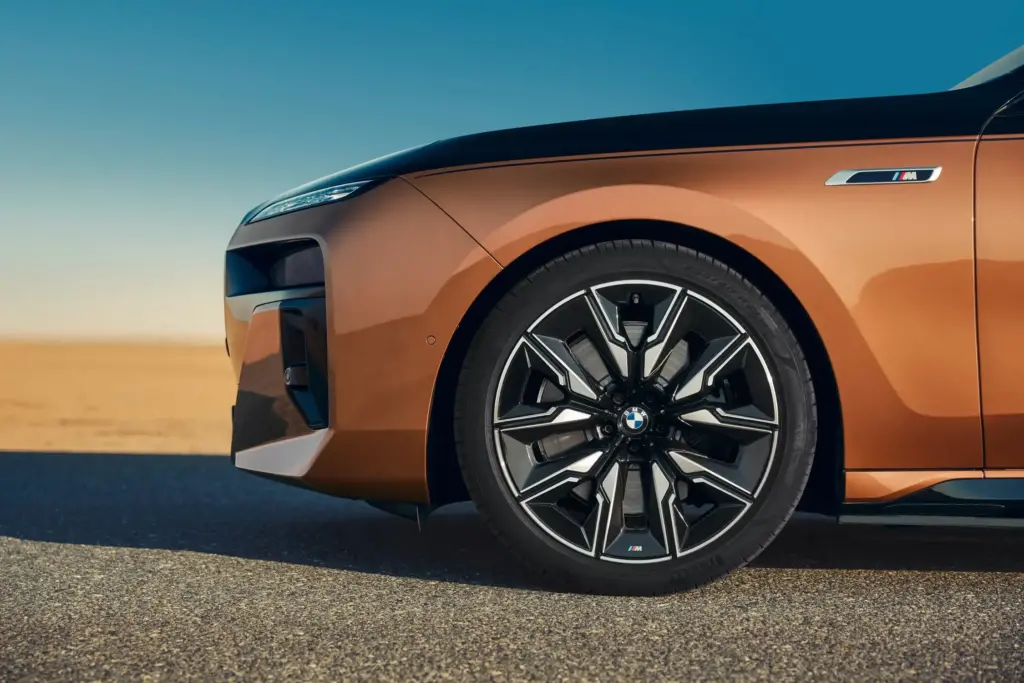
Range, charging, and real-world efficiency
Understanding the 2024 i7’s charging capabilities and real-world range expectations helps set realistic ownership expectations.
EPA range ratings by trim
Official EPA testing provides these range estimates:
- eDrive50: 321 miles (19-inch wheels maximize efficiency)
- xDrive60: 318 miles (minimal reduction from dual-motor system)
- M70 xDrive: 291-295 miles (performance-oriented powertrain trade-off)
- MPGe ratings: 74-95 MPGe combined depending on configuration
The eDrive50’s 321-mile range compares favorably to some competitors, though the Mercedes-Benz EQS achieves up to 350 miles and Tesla Model S reaches 405 miles[1].
Real-world range test results
Independent testing reveals actual range expectations under various conditions:
Highway testing (sustained 70 mph):
- eDrive50: 260-290 miles actual range
- xDrive60: 255-280 miles actual range
- M70 xDrive: 240-270 miles actual range
City/mixed driving:
- All trims: 300-320 miles achievable with conservative driving
- Regenerative braking significantly extends city range
- Climate control usage impacts range 5-15%
Cold weather impact:
- 20-30% range reduction in temperatures below freezing
- Battery preconditioning via app minimizes losses
- Heat pump system would improve efficiency (not currently available)
Real-world range typically runs 85-90% of EPA estimates, better than many competitors achieving only 75-80%[5].
Charging times and infrastructure compatibility
The 2024 i7 supports multiple charging options:
Home charging (Level 2, 240V at 11 kW):
- 0-100% charge in approximately 10-11 hours
- Overnight charging sufficient for daily driving needs
- Optional BMW Wallbox speeds charging for frequent users
Public DC fast charging (up to 195 kW):
- 10-80% charge in 30-35 minutes at peak rate
- 10-minute charge adds approximately 89-91 miles of range
- Charging speed tapers above 80% to protect battery longevity
- Three years of complimentary 30-minute Electrify America sessions included
The i7 uses the industry-standard CCS (Combined Charging System) connector compatible with most public charging networks[1]. For those interested in charging infrastructure, explore our guide to the best EV chargers for home installation.
Charging cost analysis and efficiency
Electricity costs vary significantly by region and charging method:
Home charging costs:
- $0.02-$0.08 per mile (depending on local electricity rates)
- Full charge: $10-$30 at typical residential rates ($0.10-$0.30 per kWh)
- Time-of-use plans reduce costs by charging overnight during off-peak hours
Public DC fast charging:
- $0.15-$0.35 per mile average cost
- Full charge: $45-$70 at typical public rates ($0.45-$0.70 per kWh)
- Premium location pricing may significantly exceed these estimates
Long-term savings:
Five-year fuel savings versus gas-powered 7 Series: $10,000-$15,000 assuming $3.50/gallon gas and 20 mpg for conventional model[6].
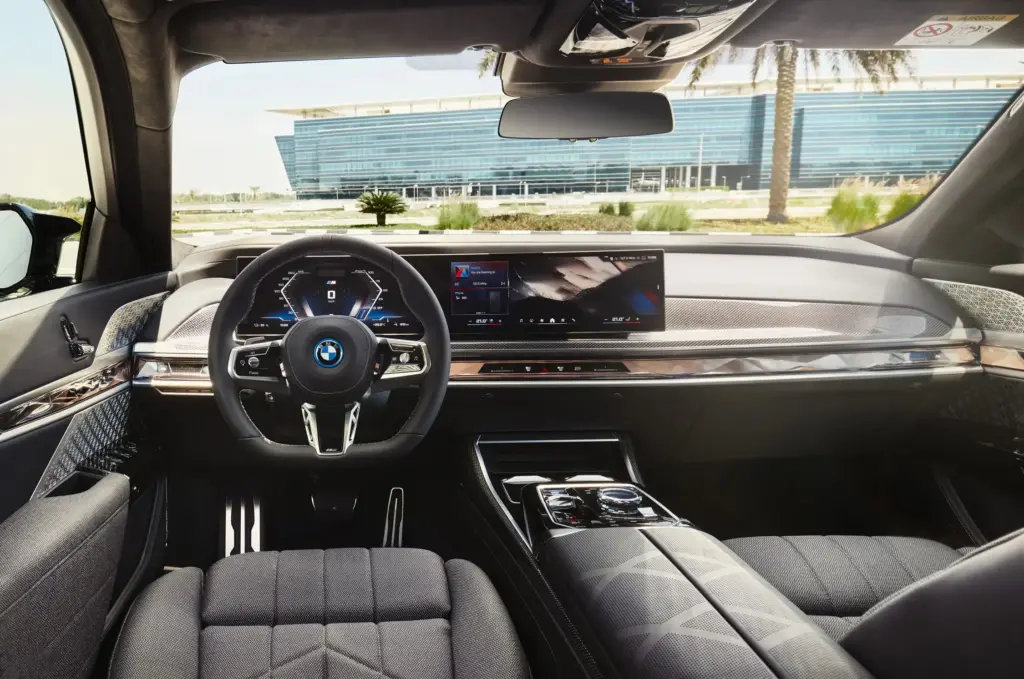
Luxury interior and cabin experience
The 2024 BMW i7 cabin represents the pinnacle of BMW luxury craftsmanship, with exceptional attention to material quality and passenger comfort that rivals or exceeds the Mercedes-Benz S-Class.
Front seat comfort and appointments
Front passengers enjoy comprehensive luxury amenities:
- Heated and ventilated Extended Merino leather seats (standard across all trims)
- 18-way power-adjustable seats with memory functions for driver and passenger
- Heated steering wheel and front armrests for cold weather comfort
- Open-pore wood trim and crystal-style controls throughout cabin
- Multicolor adjustable ambient lighting with customizable atmosphere
- Excellent visibility in most directions except rear window (cameras compensate)
The front seats provide exceptional support during extended drives, with multiple adjustment parameters allowing precise positioning[2].
Rear-seat luxury and executive features
The i7’s rear cabin represents the vehicle’s true luxury showcase:
Executive amenities:
- 42.8 inches of rear legroom providing limousine-like spaciousness
- Optional Executive Lounge Seating with massaging and ventilated rear seats
- Power-reclining rear seats with footrest creating first-class comfort
- Heated rear seats with four-zone climate control
- Small touchscreens mounted on rear doors for seat and climate control
- Power rear window and side window sunshades blocking sunlight
- Rear center console with wireless charging and dedicated controls
The rear-seat experience positions the i7 among the most comfortable vehicles available for chauffeur-driven executives[3].
Premium materials and craftsmanship
BMW offers extensive interior customization options:
- Extended Merino leather upholstery in multiple single-tone and two-tone combinations
- Open-pore wood trim selections including Mirror Oak high-gloss on xDrive60
- Aluminum accents throughout cabin adding modern contrast
- Crystal-style gear selector and iDrive controller creating premium touchpoints
- Interaction Bar with dynamic LED lighting and integrated controls
- Superior material quality rivaling or exceeding Mercedes S-Class standards
The material quality and craftsmanship justify the i7’s premium positioning in the luxury EV segment[4].
Panoramic Sky Lounge LED roof
The optional Sky Lounge LED roof transforms cabin atmosphere:
- LED-embedded panoramic glass roof with customizable lighting patterns
- Multiple light programs synchronized with driving modes
- Creates theater-like ambiance perfect for rear passengers
- Heat-reflecting laminated glass blocking solar heat gain
- Seamless integration with cabin ambient lighting system
This feature particularly impresses rear-seat passengers during evening transit, creating a premium environment that distinguishes the i7 from competitors[2].
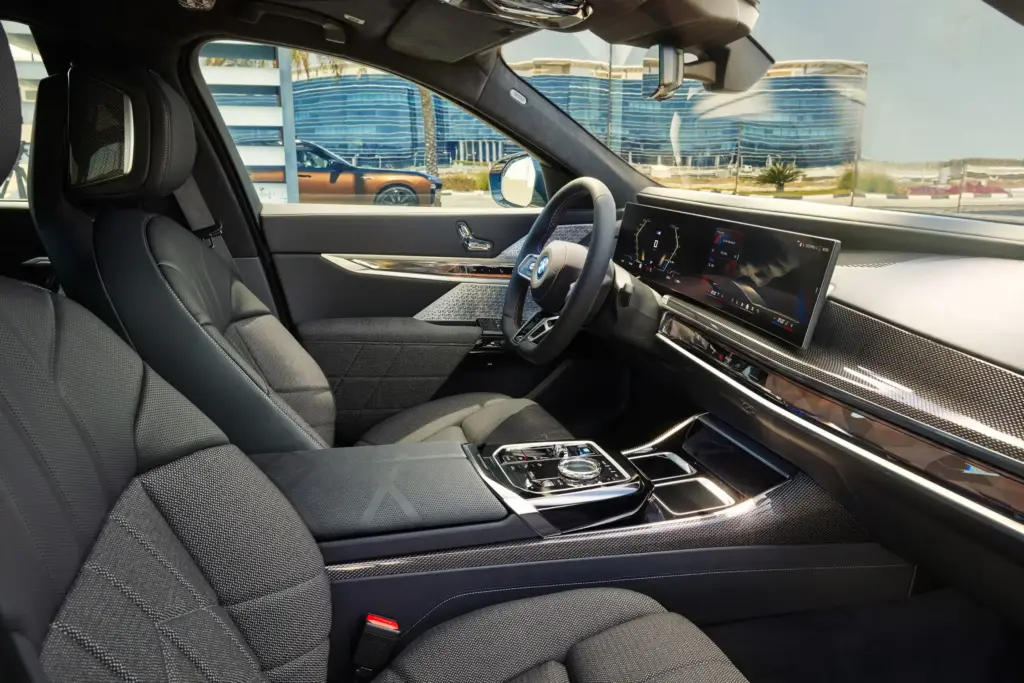
Technology and infotainment systems
The 2024 BMW i7 showcases cutting-edge technology throughout the cabin, though some owners report the interface requires a learning curve to master fully.
BMW Curved Display and Operating System 8.5
The driver-focused technology interface includes:
- 12.3-inch digital instrument cluster with customizable layouts showing critical driving information
- 14.9-inch central touchscreen with haptic feedback confirming selections
- iDrive 8.5 Operating System with improved response times addressing early complaints
- Cloud-based navigation with real-time traffic and EV charging station integration
- Voice-activated BMW Intelligent Personal Assistant responding to “Hey BMW” commands
- Wireless Apple CarPlay and Android Auto (standard on all trims)
- Over-the-air software updates keeping systems current without dealership visits
Operating System 8.5 represents BMW’s most refined infotainment platform, though some users still find the menu structure complex[1].
31-inch BMW theater screen
The optional rear-seat entertainment system delivers cinema-quality experience:
- 31-inch display with up to 8K resolution dropping down from headliner
- Amazon Fire TV integration with streaming apps including Netflix, Hulu, YouTube
- 5G connectivity enabling seamless streaming (requires BMW data plan subscription)
- HDMI port for connecting gaming consoles or laptops
- Wireless headphone connectivity (two pairs of headphones included)
- Private cinema experience transforming rear cabin into mobile theater
- Blocks rear window visibility when deployed (cameras compensate)
This $7,000-$8,500 option represents the i7’s most distinctive technology feature, unavailable on any direct competitor[2].
Audio system options and quality
BMW provides three premium audio configurations:
- Standard: Bowers & Wilkins surround sound (18 speakers)
- Optional: Enhanced Bowers & Wilkins system (36 speakers, $3,500-$4,000)
- Optional: Top-tier Bowers & Wilkins system (39 speakers, $5,000+)
The standard 18-speaker system delivers exceptional audio quality praised by reviewers, though audiophiles appreciate the upgraded systems’ concert hall acoustics[3].
Advanced connectivity and driver assistance
Additional technology features include:
- Full-color head-up display projecting navigation and driver assistance data onto windshield
- BMW Digital Key Plus enabling iPhone and Apple Watch as vehicle keys
- Remote climate control pre-conditioning cabin via smartphone app
- Personal eSIM with data connectivity (subscription required after trial)
- Highway Assistant for hands-free driving up to 80-85 mph (versus previous 40 mph limit)
- Smooth centering keeping vehicle well-centered with seamless acceleration/deceleration
The enhanced Highway Assistant represents significant improvement over the previous generation system[4].
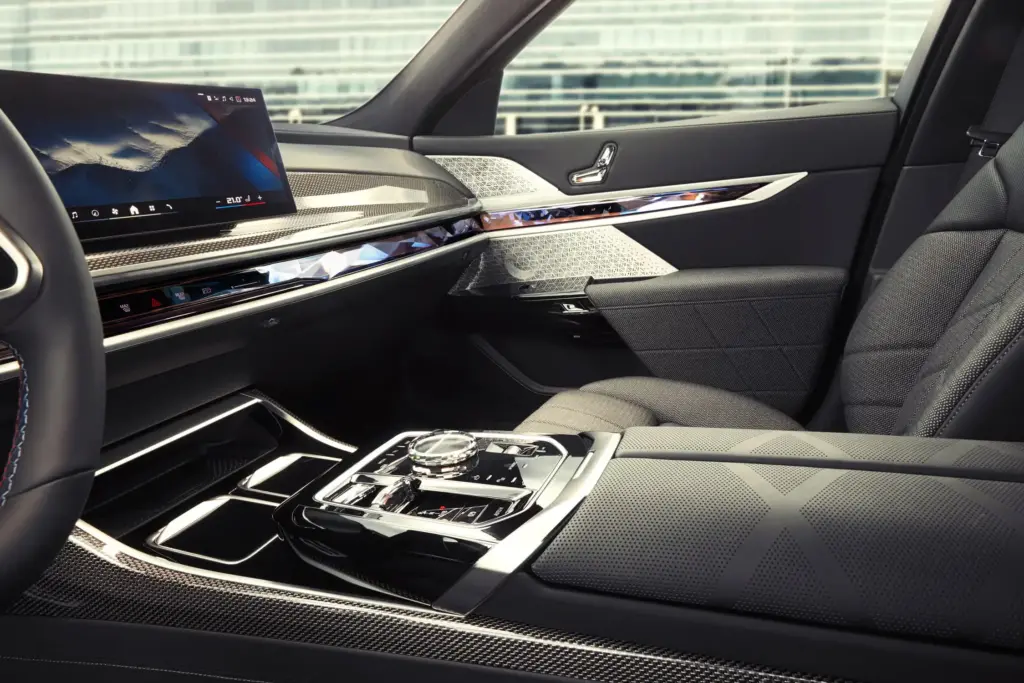
Safety features and driver assistance technology
The 2024 BMW i7 includes comprehensive safety technology as standard equipment, with additional advanced features available through optional packages.
Standard Active Driving Assistant features
Every 2024 i7 includes these safety technologies:
- Forward collision warning with automatic emergency braking preventing or mitigating crashes
- Lane departure warning with lane keeping assistance steering vehicle back into lane
- Blind-spot warning with rear cross-traffic alert monitoring adjacent lanes
- Blind-spot intervention automatically steering back if lane change attempted with vehicle present
- Acoustic pedestrian protection alerting pedestrians to quiet EV presence
- Adaptive cruise control with stop-and-go functionality for traffic
- Active Protection System pretensioning seatbelts and closing windows before impact
- Fatigue and Focus Alert monitoring driver attention levels
These systems provide comprehensive protection for both vehicle occupants and surrounding road users[1].
Available Driving Assistance Professional Package
The $2,100-$2,500 optional package adds:
- Highway Assistant with Active Lane Change enabling hands-free driving up to 85 mph
- Extended Traffic Jam Assistant managing stop-and-go driving automatically
- Active Driving Assistant Pro features expanding capability envelope
- Front cross-traffic warning detecting vehicles crossing path when pulling forward
- Evasive steering assistance helping avoid obstacles when necessary
- Emergency stop assistant safely stopping vehicle if driver becomes unresponsive
This package delivers semi-autonomous capability competitive with Mercedes-Benz Drive Pilot and Tesla Autopilot[2].
Parking and maneuvering assistance
Optional Parking Assistance Professional Package ($1,750) includes:
- Automatic parallel and perpendicular parking handling tight spaces
- Surround View with 3D visualization showing vehicle from above
- Remote Parking via smartphone allowing parking from outside vehicle
- Back-up Assistant remembering last 50 yards of forward travel for precise reverse maneuvering
- Multiple camera views compensating for theater screen blocking rear window
- Drive Recorder and stored frequent parking maneuvers
These features simplify parking the i7’s substantial 212.2-inch length in tight urban environments[3].
Crash safety and structural protection
BMW engineered comprehensive passive safety features:
- Dual front side-mounted airbags and front/rear head airbags
- Knee airbags for driver and front passenger
- Electronic stability control and traction control
- 4-wheel ABS with electronic brake-force distribution
- Battery protection structure with reinforced frame shielding cells
- LATCH child seat anchors (lower anchors easy to access, top anchors require reaching around tall headrests)
- Expected strong crash test ratings (NHTSA and IIHS testing not yet published for 2024)
The battery protection structure adds substantial structural rigidity while shielding the high-voltage battery from impact damage[4].
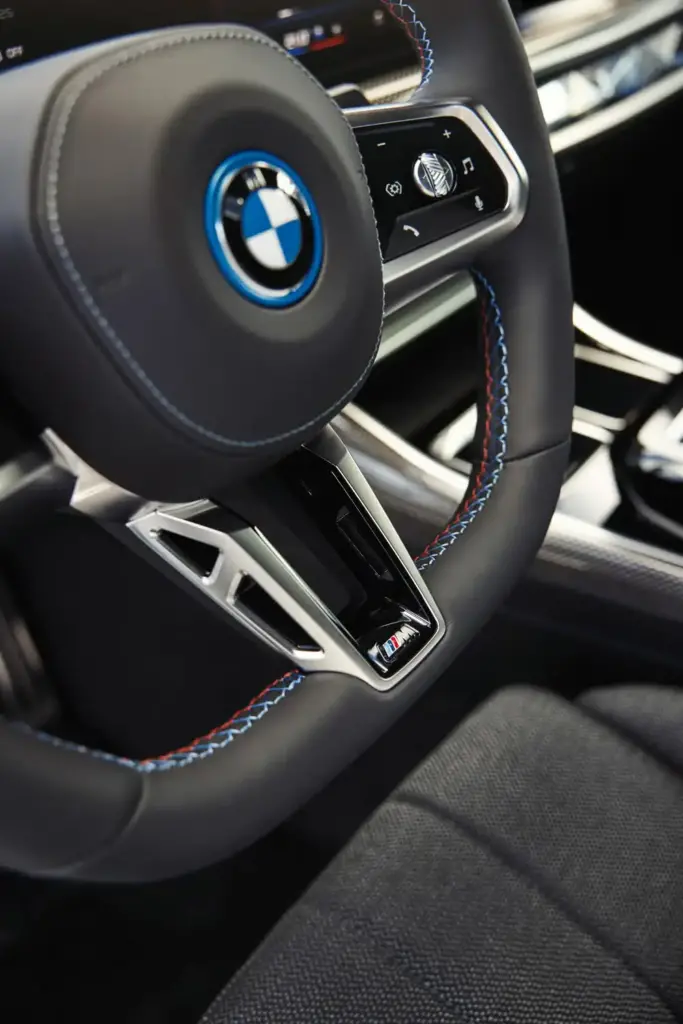
Available color options and customization
BMW offers extensive exterior and interior color personalization for 2024 i7 buyers seeking distinctive appearance.
Standard exterior colors
Eight no-cost exterior colors include:
- Alpine White (solid, non-metallic pure white)
- Carbon Black Metallic (deep glossy black)
- Black Sapphire Metallic (blue-tinted black)
- Dark Graphite Metallic (charcoal grey)
- Mineral White Metallic (pearlescent white)
- Oxide Grey Metallic (medium grey)
- Brooklyn Grey Metallic (color-shifting grey/blue appearance)
- Space Silver Metallic (light silver)
These colors provide classic luxury sedan aesthetics appropriate for professional executive use[1].
Premium and Individual colors
Four premium metallic finishes add approximately $1,950:
- Individual Tanzanite Blue Metallic (signature BMW color)
- Individual Dravit Grey Metallic (sophisticated dark grey)
- Aventurin Red Metallic (rich burgundy-red)
- Sparkling Copper Metallic (unique luxury finish with bronze undertones)
These colors provide more distinctive appearance for buyers wanting to stand out from typical luxury sedan fleet vehicles[2].
Exclusive frozen and two-tone finishes
Premium matte and two-tone options add $5,000-$6,000:
- Frozen Deep Grey (M70 exclusive matte finish requiring special care)
- BMW Individual Two-Tone combinations creating ultra-premium appearance
- Liquid Copper/Sapphire Black Metallic two-tone option
Frozen finishes require specialized care procedures and cannot be polished using traditional methods, making them best suited for garage-stored vehicles[3].
Interior color combinations
BMW offers extensive interior personalization:
- Extended Merino leather in multiple single-tone options
- Available two-tone interior combinations
- Open-pore wood trim selections
- Mirror Oak high-gloss trim (xDrive60 standard)
- Customization options through BMW Individual program for ultimate personalization
The interior color options allow buyers to create truly distinctive cabin environments matching personal preferences[4].
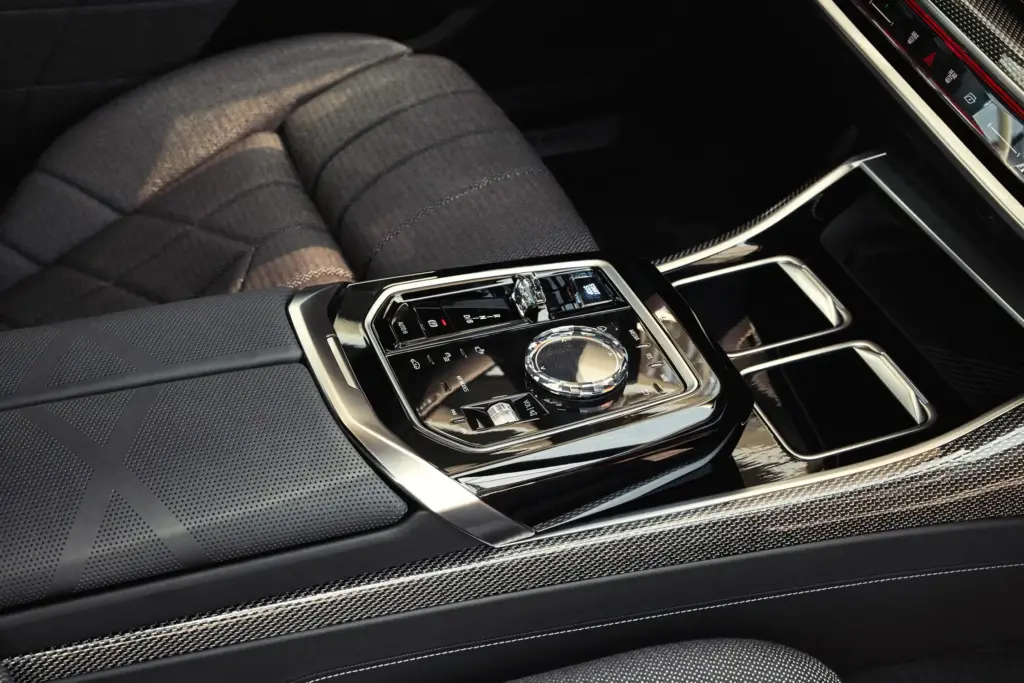
Pricing and value proposition
Understanding total ownership costs helps evaluate whether the 2024 BMW i7 delivers appropriate value for its substantial premium positioning.
MSRP by trim level (2024 model year)
Base pricing before options:
- eDrive50: $106,695 starting price (including $995 destination)
- xDrive60: $125,195 starting price (including destination)
- M70 xDrive: $169,495 starting price (including destination)
The i7 positions just $1,300 above the Mercedes-Benz EQS 450+ ($104,400) at base level, though significantly above Tesla Model S ($74,990-$89,990) and Lucid Air ($69,900) entry pricing[1]. Understanding MSRP pricing helps buyers negotiate effectively with dealers.
Popular package and option pricing
Common option packages add substantial cost:
- Executive Lounge Seating Package: $4,500-$5,000 (massaging/reclining rear seats)
- 31-inch Theater Screen Package: $7,000-$8,500 (8K display with Amazon Fire TV)
- Driving Assistance Professional Package: $2,100-$2,500 (Highway Assistant)
- Parking Assistance Professional: $1,750 (Surround View, Remote Parking)
- Enhanced Bowers & Wilkins audio: $3,500-$5,000 (36 or 39 speakers)
- Premium paint colors: $1,950
- Two-tone paint: $5,000-$6,000
Well-equipped xDrive60 models typically reach $145,000-$155,000, while loaded M70 variants easily exceed $200,000[2].
Total ownership costs and depreciation
Five-year ownership cost projections:
- Well-equipped xDrive60 typically reaches $145,000-$155,000 as configured
- Loaded M70 variants easily exceed $200,000 with premium options
- Expected depreciation: approximately 50% over five years (typical luxury sedan)
- Insurance costs higher than gas-powered 7 Series due to vehicle value
- Maintenance costs significantly lower (fewer moving parts, no oil changes)
The lower maintenance requirements partially offset higher initial purchase price and insurance costs[6].
Federal tax credit and incentive eligibility
Tax credit considerations:
- Federal EV tax credit: Not eligible for individual purchases (MSRP exceeds $80,000 sedan cap)
- State and local incentives: Vary significantly by location
- Some states offer additional EV rebates regardless of federal limits
- HOV lane access available in select states regardless of passenger count
- BMW Financial Services offers competitive lease and finance programs
- Business lease arrangements may still qualify for tax benefits
The lack of federal tax credit eligibility represents significant disadvantage versus lower-priced competitors[1].
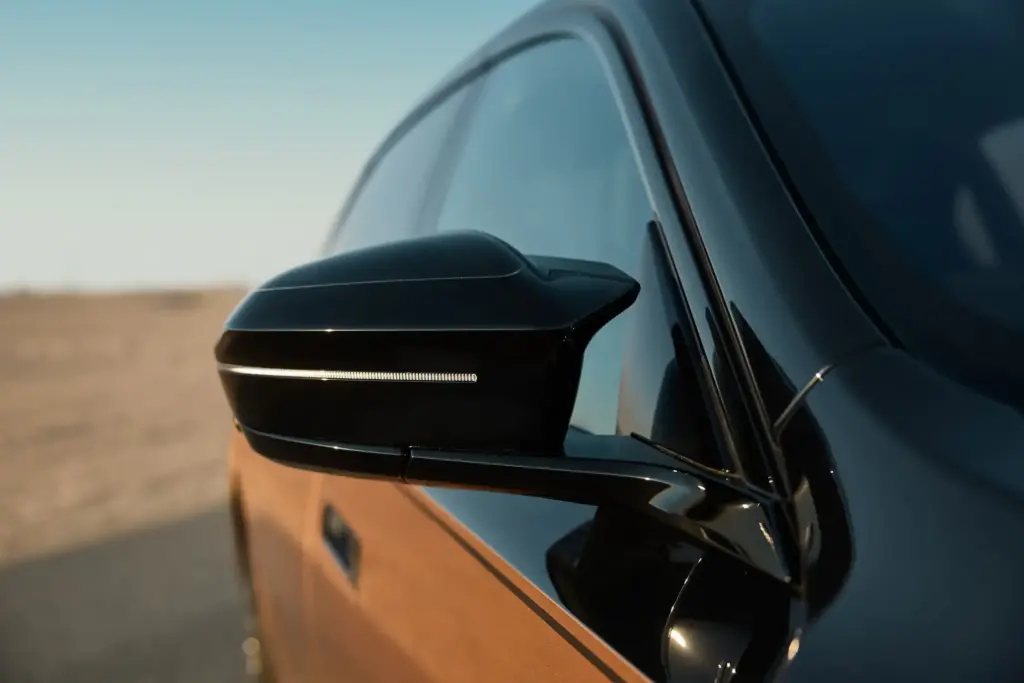
Competitive comparison and alternatives
The luxury electric sedan segment offers several compelling alternatives to the 2024 BMW i7, each with distinct advantages and target audiences.
Mercedes-Benz EQS sedan
Mercedes’ flagship electric sedan competes directly:
EQS advantages:
- Longer EPA range (up to 350 miles vs i7’s 321 miles)
- More futuristic MBUX Hyperscreen spanning entire dashboard
- Base EQS 450+ only $1,300 less than i7 eDrive50
- Cab-forward design maximizing interior space
- Smoother, more aerodynamic exterior styling
i7 advantages:
- Superior rear-seat entertainment (31-inch Theater Screen)
- More traditional luxury sedan proportions appealing to conservative buyers
- Established BMW performance reputation
- Better real-world range efficiency (85-90% of EPA vs 75-80%)
The choice often depends on design preference and technology philosophy[5].
Tesla Model S
Tesla’s flagship sedan offers different value proposition:
Model S advantages:
- Plaid variant delivers supercar performance (0-60 in 1.99 seconds)
- Longer range (up to 405 miles EPA-rated on Long Range)
- Extensive Supercharger network access nationwide
- Significantly lower starting price ($74,990-$89,990)
- Regular over-the-air feature additions expanding capability
i7 advantages:
- Traditional luxury materials and craftsmanship
- Superior rear-seat comfort and amenities
- Established BMW dealership service network
- More conservative styling appropriate for corporate executive use
- Quieter, more refined ride quality
The Model S appeals to tech-forward buyers prioritizing range and performance over traditional luxury[3].
Lucid Air
The American luxury EV startup offers impressive specifications:
Lucid Air advantages:
- Superior range (up to 516 miles on Grand Touring trim)
- Massive 41.7 cubic feet of front trunk space (i7 has none)
- Lower starting price ($69,900 for base Pure)
- More minimalist, futuristic design philosophy
- Exceptional aerodynamic efficiency (0.21 drag coefficient)
i7 advantages:
- Established BMW service network infrastructure nationwide
- Proven long-term reliability track record
- Traditional luxury brand cachet and prestige
- More comprehensive dealer support in all regions
- Superior material quality and craftsmanship
Lucid’s limited service network presents greatest obstacle for buyers outside major metropolitan areas[4].
Other luxury electric alternatives
Additional competitors worth considering:
- Porsche Taycan: Sportier handling focus, lower range (225-288 miles)
- Audi e-tron GT: Performance-oriented, RS model delivers 637 hp
- Genesis Electrified G80: Value proposition at $74,000 starting price
- Rolls-Royce Spectre: Ultra-luxury positioning at $420,000+ price point
Each alternative serves specific buyer priorities from performance to value to ultimate luxury[2].
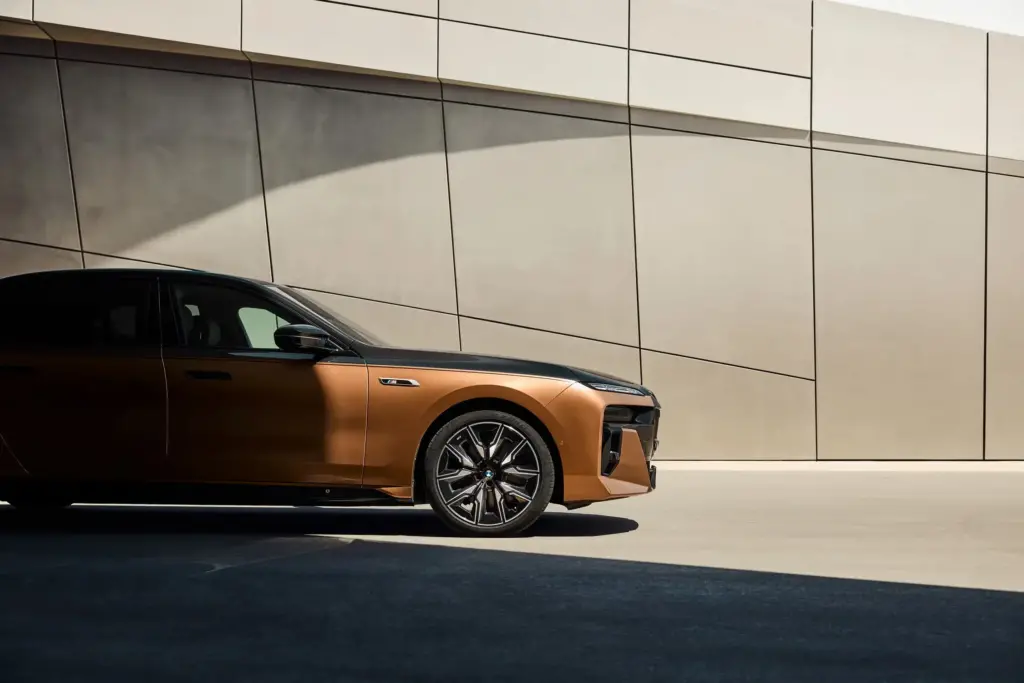
Common problems and owner feedback
While the 2024 BMW i7 delivers impressive luxury and technology, early adopters report several issues worth considering before purchase.
Reported issues from early adopters
Common complaints from i7 forums and owner surveys:
- Tech interface learning curve: Not particularly intuitive requiring significant time investment
- Infotainment system lag: Some owners report occasional freezes requiring restart
- Theater screen connectivity: Buffering issues with streaming apps despite 5G connection
- Complex menu structure: Overwhelming for some users preferring simpler interfaces
- Software updates address some issues but learning curve remains substantial
BMW continues refining the system through over-the-air updates, though fundamental interface complexity persists[5].
Build quality and interior concerns
Quality issues reported by owners:
- Limited small-item storage: Throughout cabin inadequate for modern needs
- Tiny center console bin: Insufficient for storing larger smartphones and accessories
- Door pockets lack adequate space: Bottle holders limit available storage
- No good place to store items larger than smartphone
- Child seat installation challenging: Top LATCH anchors require reaching around tall headrests (lower anchors easy with leather flap)
Storage limitations represent most common complaint among owners accustomed to traditional luxury sedans[3].
Performance and range feedback from owners
Owner experiences regarding range and performance:
Positive feedback:
- Real-world range runs 85-90% of EPA estimates (better than many EVs)
- Smooth, quiet, comfortable ride quality exceeds expectations
- Effortless acceleration impresses passengers and owners
- City driving achieves better range than highway driving
Areas for improvement:
- Cold weather significantly impacts range (20-30% reduction)
- Highway driving reduces range more than expected
- Some owners report minor wind noise at highway speeds
Most owners report satisfaction with performance once realistic range expectations are established[4].
Long-term reliability outlook
Predicting long-term reliability involves these considerations:
- Limited long-term data (model launched 2023, expanded 2024)
- BMW’s electric vehicle track record with i3, iX, and i4 shows promise
- Battery degradation expectations: 5-10% capacity loss over 100,000 miles (industry standard)
- Comprehensive warranty coverage: 4 years/50,000 miles basic, 8 years/100,000 miles battery
- Lower maintenance requirements versus gas-powered vehicles (fewer moving parts)
According to Autvex reliability analysis, luxury electric vehicles typically experience fewer mechanical issues than conventional powertrains, though technology complexity creates occasional frustration[6].
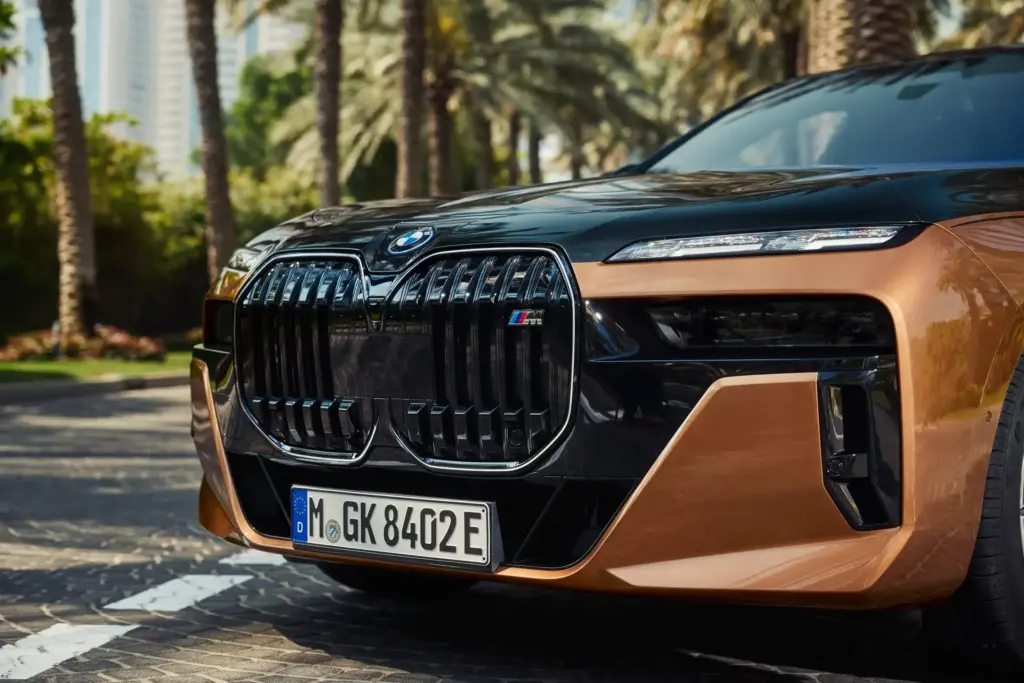
Cargo space and practicality
The 2024 BMW i7 prioritizes passenger comfort over cargo versatility, creating some practical limitations for active families or frequent travelers.
Trunk capacity and limitations
Cargo specifications reveal constraints:
- 17.7-18 cubic feet of trunk space (below luxury sedan segment average)
- No front trunk/frunk (battery pack occupies front compartment entirely)
- Rear seats do not fold in standard configuration limiting flexibility
- Limited vertical cargo capacity due to shallow floor
- No pass-through opening for longer items like skis
The trunk capacity significantly trails Mercedes-Benz EQS (22 cubic feet) and dramatically lags Lucid Air’s massive 41.7 cubic feet of front trunk space[1].
Interior storage solutions
Small-item storage throughout cabin:
- Minimal small-item storage throughout cabin
- Tiny center console bin inadequate for modern smartphone and accessory needs
- Limited door pocket space with bottle holders consuming available room
- Glovebox exists but cannot be easily reached from driver position
- Rear executive console provides some additional storage for passengers
Storage limitations represent common frustration among owners accustomed to traditional luxury sedans with superior storage solutions[3].
Practicality for daily use and family needs
The i7’s practicality assessment:
Best suited for:
- Chauffeur-driven executives prioritizing rear-seat comfort over cargo
- Couples without extensive cargo needs for daily driving
- Business travel and airport transportation services
- Urban luxury sedan use with minimal cargo requirements
Not ideal for:
- Active families requiring sports equipment transport regularly
- Family road trips requiring luggage for multiple passengers
- Buyers needing versatile interior storage for daily items
- Those requiring maximum cargo flexibility for lifestyle needs
Buyers needing greater cargo versatility should consider the BMW iX SUV, X7, or Mercedes-Benz EQS SUV alternatives offering more practical packaging[2].
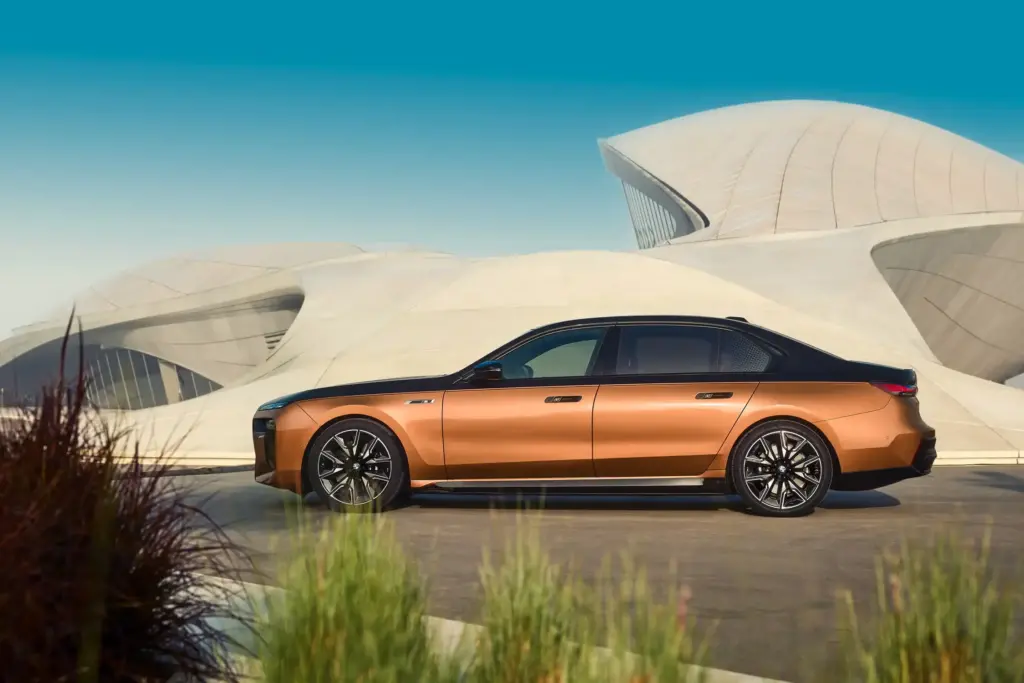
Is the 2024 BMW i7 worth buying?
Determining whether the 2024 i7 justifies its substantial premium pricing depends on individual priorities, use cases, and value perspectives.
Best for
The 2024 i7 excels for these buyer profiles:
- Executives seeking electric luxury without compromising traditional amenities or brand prestige
- Tech enthusiasts wanting cutting-edge features including the unique 31-inch Theater Screen
- Buyers prioritizing rear-seat comfort and entertainment over cargo capacity or maximum range
- Former 7 Series owners transitioning to electric powertrains while maintaining BMW loyalty
- Chauffeur-driven professionals valuing limousine-like experience and presence
- Those with home charging access or comprehensive public infrastructure in their daily routes
- Buyers valuing ride comfort and traditional luxury over pure electric efficiency metrics
Not ideal for
The 2024 i7 may disappoint these buyers:
- Maximum range seekers requiring 300+ miles consistently (consider Mercedes EQS or Lucid Air)
- Budget-conscious luxury EV shoppers (Tesla Model S offers significantly better value proposition)
- Extensive cargo space needs (consider BMW iX, X7, or Mercedes EQS SUV)
- Active families requiring versatile interior storage for sports equipment and gear
- Limited charging infrastructure regions lacking adequate public charging networks
- Drivers uncomfortable with complex technology interfaces requiring learning curve
Key advantages summary
The 2024 i7’s strongest selling points:
- Best-in-class rear-seat entertainment (31-inch theater screen unique in segment)
- Exceptionally smooth, quiet, comfortable ride quality exceeding most competitors
- Sophisticated technology with BMW’s refined user interface (despite learning curve)
- Strong performance across all three trim levels (eDrive50, xDrive60, M70)
- Comprehensive luxury appointments and premium materials throughout cabin
- Established BMW service network and brand reputation nationwide
- Traditional luxury sedan styling appealing to conservative executive buyers
Main drawbacks summary
Consider these significant limitations:
- Lower range than Mercedes EQS (350 miles) and Lucid Air (516 miles)
- Significantly higher price than Tesla Model S (over $30,000 premium)
- Limited cargo space versus competitors (no front trunk, small rear trunk)
- Tech interface learning curve frustrates some users preferring simpler systems
- Minimal small-item storage throughout interior inadequate for modern needs
- Does not qualify for federal EV tax credit (exceeds $80,000 MSRP cap)
- Cold weather range reduction more significant without available heat pump system
According to Autvex automotive experts, the 2024 i7 delivers exceptional value for buyers prioritizing rear-seat luxury, traditional craftsmanship, and BMW brand prestige over maximum range or pure value metrics[6]. For those considering the 2025 model updates, check out our comprehensive 2025 BMW i7 review for comparison.
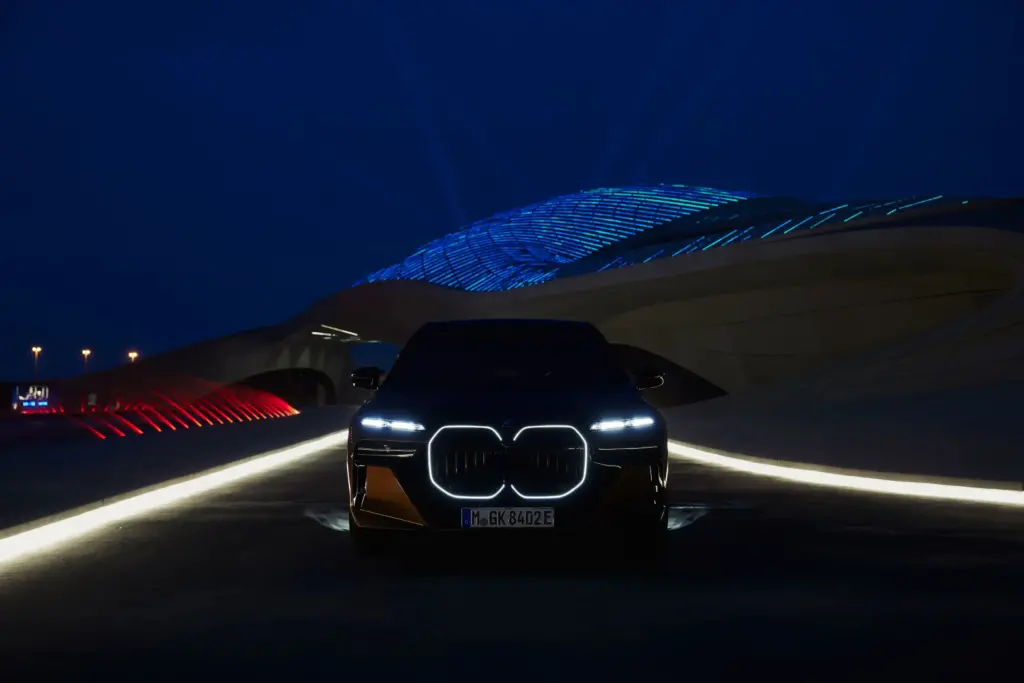
Key takeaways
- The 2024 BMW i7 offers three trims (eDrive50, xDrive60, M70) with 291-321 miles EPA range and pricing from $106,695 to $169,495.
- The optional 31-inch theater screen with 8K resolution provides industry-leading rear-seat entertainment unavailable on any direct competitor.
- Real-world range typically runs 85-90% of EPA estimates with cold weather reducing range by 20-30% below freezing.
- Limited cargo space (17.7 cubic feet, no front trunk) and minimal small-item storage throughout cabin represent main practical drawbacks.
- The vehicle does not qualify for federal EV tax credit due to MSRP exceeding $80,000 sedan cap for individuals.
- Enhanced Highway Assistant enables hands-free driving up to 80-85 mph, significantly improved from previous 40 mph limit.
- Build quality concerns include limited storage, tech interface learning curve, and child seat installation challenges with top LATCH anchors.
FAQs about the 2024 BMW i7
What’s new in the 2024 BMW i7?
The 2024 model year introduces the new eDrive50 rear-wheel-drive entry trim at $106,695 and high-performance M70 all-wheel-drive variant at $169,495. BMW also enhanced Highway Assistant to allow hands-free driving up to 80-85 mph (versus previous 40 mph limit) and refined Operating System 8.5 with improved response times[2].
How much does a 2024 BMW i7 cost?
The 2024 BMW i7 starts at $106,695 for the eDrive50 (including $995 destination), $125,195 for the xDrive60, and $169,495 for the M70 xDrive. Well-equipped xDrive60 models typically reach $145,000-$155,000, while loaded M70 variants easily exceed $200,000 with premium options like the Theater Screen and Executive Lounge Seating[1].
What is the real-world range of the 2024 BMW i7?
Real-world range runs 85-90% of EPA estimates depending on conditions. Highway driving at 70 mph yields 260-290 miles for the eDrive50, while city/mixed driving achieves 300-320 miles with conservative driving. Cold weather below freezing reduces range by 20-30%, making the eDrive50’s practical winter range approximately 225-250 miles[5].
Is the 2024 BMW i7 more expensive than the Mercedes EQS?
The BMW i7 eDrive50 starts at $106,695, only $1,300 more than the Mercedes-Benz EQS 450+ at $104,400. However, the top-tier i7 M70 at $169,495 significantly exceeds the EQS 580 at $147,550. Both vehicles reach similar prices when comparably equipped with luxury options and technology packages[1].
Does the BMW i7 have a front trunk (frunk)?
No, the 2024 BMW i7 does not include a front trunk. The battery pack and electric motor components occupy the front compartment entirely, leaving only 17.7-18 cubic feet of cargo space in the rear trunk. This contrasts significantly with competitors like the Lucid Air offering 41.7 cubic feet of front trunk storage[3].
How long does it take to charge a 2024 BMW i7?
Home charging using a 240V Level 2 charger (11 kW) takes approximately 10-11 hours for a full charge from empty. Public DC fast charging can replenish 10-80% battery capacity in 30-35 minutes at peak 195 kW charging rate. A 10-minute fast charge adds approximately 89-91 miles of range for quick top-ups[1].
Can the BMW i7 use Tesla Superchargers?
Currently, the 2024 BMW i7 cannot use Tesla Superchargers as it uses the CCS (Combined Charging System) connector rather than Tesla’s proprietary NACS connector. However, BMW has announced plans to adopt the NACS standard beginning in 2025, which may enable Supercharger access for future model years with adapter availability[4].
Is the BMW i7 worth the premium over a Tesla Model S?
The i7 justifies its $30,000+ premium over the Tesla Model S ($74,990-$89,990) for buyers prioritizing traditional luxury materials, superior rear-seat comfort, the unique 31-inch theater screen, and BMW’s established service network. However, the Model S delivers better value with longer range (405 miles), faster acceleration (Plaid), and access to Tesla’s extensive Supercharger network[3].
What problems have 2024 BMW i7 owners reported?
Common issues include tech interface learning curve frustrations, limited small-item storage throughout cabin, infotainment system occasional lag or freezes, theater screen connectivity and buffering issues, tiny center console bin inadequate for modern needs, and child seat installation challenges with top LATCH anchors requiring reaching around tall headrests[5].
Does the 2024 BMW i7 qualify for the federal EV tax credit?
No, the 2024 BMW i7 does not qualify for the $7,500 federal EV tax credit for individual purchases because its MSRP exceeds the $80,000 cap for electric sedans. However, business lease arrangements may still qualify for the credit, which gets passed through as reduced lease payments. Check with BMW Financial Services for current incentive availability[1].
How does the BMW i7 compare to the Lucid Air?
The Lucid Air offers superior range (up to 516 miles vs i7’s 321 miles), massive front trunk space (41.7 cubic feet vs none), and lower starting price ($69,900 vs $106,695). The i7 advantages include established BMW service network nationwide, proven reliability track record, traditional luxury brand prestige, and superior material quality and craftsmanship throughout the cabin[4].
What is the warranty coverage on the 2024 BMW i7 battery?
BMW provides an 8-year/100,000-mile battery warranty covering defects and capacity degradation below specified thresholds. The comprehensive vehicle warranty covers 4 years/50,000 miles for all components. Expected battery degradation runs 5-10% over 100,000 miles, consistent with industry standards for lithium-ion battery packs in premium electric vehicles[6].
Is the 31-inch theater screen worth it in the i7?
The $7,000-$8,500 Theater Screen Package justifies its cost for buyers prioritizing rear-seat entertainment during extended travel. The 8K resolution display with Amazon Fire TV integration, 5G connectivity, HDMI port, and included wireless headphones creates cinema-quality experience unavailable on any competitor. However, it blocks rear window visibility when deployed, requiring reliance on cameras[2].
How comfortable are the rear seats in the BMW i7?
The i7 offers exceptional rear-seat comfort with 42.8 inches of legroom providing limousine-like spaciousness. The optional Executive Lounge Seating package ($4,500-$5,000) adds massaging and ventilated seats, power recline with footrest, heated seats, four-zone climate control, small touchscreens on rear doors, and power sunshades creating first-class airline comfort rivaling Rolls-Royce[3].
References
- Edmunds. (2024). 2024 BMW i7 Prices, Reviews, and Pictures. https://www.edmunds.com/bmw/i7/2024/
- Car and Driver. (2023). 2024 BMW i7 Review, Pricing, and Specs. https://www.caranddriver.com/bmw/i7-2024
- TrueCar. (2024). 2024 BMW i7 Review | Pricing, Trims & Photos. https://www.truecar.com/overview/bmw/i7/2024/
- BMW Blog. (2024). 2024 BMW i7 vs. Mercedes-Benz EQS – The Differences. https://www.bmwblog.com/2024/04/01/2024-bmw-i7-vs-mercedes-benz-eqs/
- Capital One. (2024). 2024 BMW 7 Series Review and Test Drive. https://www.capitalone.com/cars/learn/finding-the-right-car/2024-bmw-7-series-review-and-test-drive/3545
- J.D. Power. (2024). 2024 BMW i7 Reliability, Consumer Ratings & Pricing. https://www.jdpower.com/cars/2024/bmw/i7

I am a senior automotive analyst at Autvex. Expert vehicle evaluations, in-depth reviews, and objective analysis helping readers make informed automotive decisions with years of industry experience.



